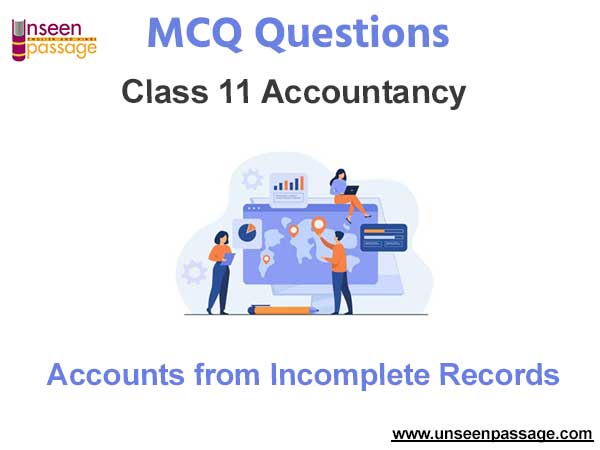Accounts from Incomplete Records MCQ Class 11 Accountancy
Please refer to Chapter 11 Accounts from Incomplete Records MCQ Class 11 Accountancy with answers below. These multiple-choice questions have been prepared based on the latest NCERT book for Class 11 Accountancy. Students should refer to MCQ Questions for Class 11 Accountancy with Answers to score more marks in Grade 11 Accountancy exams. Students should read the chapter Accounts from Incomplete Records and then attempt the following objective questions.
MCQ Questions Class 11 Accountancy Chapter 11 Accounts from Incomplete Records
Accounts from Incomplete Records MCQ Class 11 Accountancy provided below covers all important topics given in this chapter. These MCQs will help you to properly prepare for exams.
Question. Statement of affairs is prepared to-
(a) Know about assets
(b) Know about liabilities
(c) Calculate capital
(d) Know financial position.
Answer
c
Question. If books are kept under single entry system, opening stock is ascertained by preparing
(a) Opening Statement of Affairs
(b) Stock Register
(c) Memorandum Trading Account
(d) Opening Stock Account
Answer
C
Question. In single entry two-fold aspect of transaction are not recorded, so it is:
(a) Incomplete and Scientific
(b) Incomplete and Unscientific
(c) Complete and Unscientific
(d) Complete and Scientific
Answer
C
Question. Normally single entry system is suitable for:
(a) Small scale business
(b) Large scale business
(c) Both of them
(d) None of them
Answer
A
Question. Statements of assets & liabilities prepared under single entry system is called:
(a) Balance sheet
(b) Profit & loss statement
(c) Statement of affairs
(d) Income Statement
Answer
C
Question. Accounts are usually held using a single entry scheme by:
(a) Society
(b) Company
(c) Sole Trader
(d) Government
Answer
C
Question. Accounts which are maintained under single entry system-
(a) Impersonal accounts
(b) Personal accounts
(c) (a) & (b) both
(d) None of these.
Answer
B
Question. If opening capital is Rs.(i)0,000 & closing capital is Rs.(i)5,000 then profit or loss:
(a) Loss of Rs.5,000
(b) Profit of Rs.2,500
(c) Profit of Rs.5,000
(d) None of these
Answer
C
Question. Statement of affairs is a
(a) Statement of income and expenditure
(b) Statement of assets and liabilities
(c) Summary of cash transactions
(d) Summary of credit transactions
Answer
C
Question. More accurate profit & loss account can be prepared in:
(a) Single entry system
(b) Modern accounting system
(c) Double entry system
(d) None of them
Answer
C
Question. Incomplete record mechanism of book keeping is
(a) Unsystematic
(b) Unscientific
(c) Scientific
(d) Both (b) and (c)
Answer
B
Question. Bills Payable honoured during the year will be debited to
(a) Cash Account.
(b) Bills Payable Account.
(c) Creditors Account.
(d) None of these.
Answer
B
Question. A system of accounting which is not based on double entry system is called-
(a) Cash system
(b) Incomplete accounting system
(c) Mahajani system of accounting
(d) None of these.
Answer
C
Question. Opening capital is ascertained by preparing :
(a) Total debtors account
(b) Total creditors account
(c) Cash account
(d) Opening statement of affairs
Answer
D
Question. Credit purchase, during the year is ascertained by preparing :
(a) Total creditor’s account
(b) Total debtor’s account
(c) Cash account
(d) Opening statement of affairs
Answer
A
Question. Opening capital is ascertained by preparing
(a) Total creditor’s account
(b) Total debtor’s account
(c) Cash account
(d) Opening statement of affairs
Answer
D
Question. Credit sale is determined by preparing:
(a) Sales Account
(b) Creditors Account
(c) Debtors Account
(d) None of these
Answer
C
Question. Profit can be ascertained from the incomplete records under single entry by using.
(a) Only Statement of Affairs Method
(b) Only Conversion Method
(c) Either (a) or (b) above
(d) None of (a) or (b)
Answer
C
Question. Generally incomplete records are maintained by-
(a) Trader
(b) Society
(c) Company
(d) Government.
Answer
A
Question. Single Entry System can be adopted by
(a) Small firms.
(b) Co-operative Societies.
(c) Joint Stock Companies.
(d) None of these,
Answer
A
Question. If books are kept under single entry system , credit sales are ascertained by preparing
(a) Total Creditors Account
(b) Total Debtors Account
(c) Trading Account
(d) Credit Sales Account
Answer
B
Question. If book are kept under single entry system, credit purchases are ascertained by preparing
(a) Total Creditors Account
(b) Total Debtors Account
(c) Credit Purchases Account
(d) Bills Payable Account
Answer
A
Question. When closing capital is more than opening capital, it denotes:
(a) Profit
(b) Loss
(c) No Profit no loss
(d) Profit, if there is no introduction of fresh capital
Answer
D
Question. Generally incomplete records are maintained by-
(a) Trader
(b) Society
(c) Company
(d) Government.
Answer
A
Question. Excess of ……….over………represents loss sustained during the period.
Answer
(Opening capital, closing capital)
Question. To ascertain the profit, closing capital is to be adjusted by deducting ……….and adding ……….
Answer
(Fresh capital introduced, drawings)
Question. Incomplete records are generally used by ……………….
Answer
small traders
Question. Credit sales can be ascertained as the balancing figure in the …………….. account.
Answer
total debtor’s
Question. Single entry system cannot be converted into double entry system.
Answer
False
Question. …………… Accounts are maintained under single entry system.
Answer
Personal

We hope you liked the above Accounts from Incomplete Records MCQ Class 11 Accountancy. In case you have any questions please put them in the comments box below and our teachers will provide you a response.
